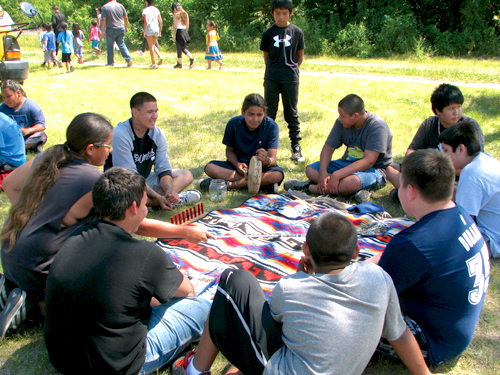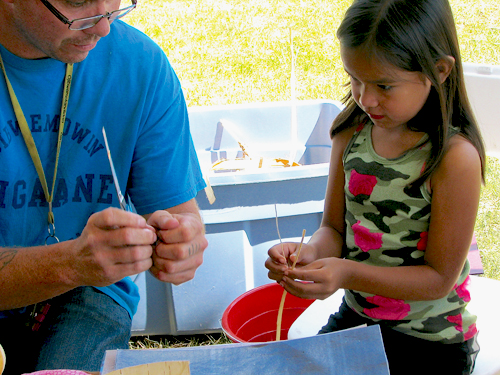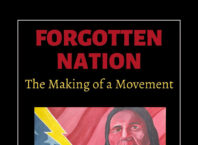 For the third year in a row, the Red
For the third year in a row, the Red
Lake Band hosted an Ojibwe Language and Culture Camp for youth
from July 21-23 in Ponemah, Minn.
The three-day Gabeshiwin (camp), hosted
by Red Lake Chemical Health and Red Lake Economic Development
and Planning, featured eating traditional foods, lacrosse,
moccasin game, plant gathering practices and identification, birch
bark crafts, traditional Anishinaabe teachings and more. Gabeshiwin
is a part of Red Lake Nation’s Ojibwemowin Revitalization
efforts.
As elders pass away, the people of the
Red Lake Nation are concerned that language and tradition will
disappear. To combat those fears, Red Lake officials are focused on
language revitalization and related efforts to retain tribal
culture. Much of indigenous culture depends on Native language, as
many concepts cannot be translated to English.
The camp was held at the Round House in
Ponemah, near the Point, home to more than half of the remaining
fluent Ojibwemowin speakers in the United States.
At camp, children participated in
Ojibwe sports and crafts, ate traditional foods and learned about
traditional spiritual ceremonies and plant-gathering practices
at Obaashiing, a village known for practicing traditional ways.
By far this was the most well-attended
camp yet with 74 youth and 56 elders, staff and parents attending
the first day. In 2013 only 30 children, 10 to 14 years-old, attended
but that attendance nearly doubled in 2014. Each day started off with
a hearty breakfast of traditional foods, which was served throughout
the camp as part of the curriculum.
Tom Barrett, Sr., Director of Red Lake
Chemical Health Programs, and a major sponsor of Gabeshiwin (the
camp) provided some background. “Our language was basically
stripped from us a generation or two ago. The children were forbidden
to talk their native language.”
Barrett recalled how U.S. government
authorities swept onto reservations and took Ojibwe children to
boarding schools to assimilate to the white culture. The ripple
effects of that action are still being felt by American Indians
today.
“We feel if we can raise kids’ self
esteem their chance of using chemicals will be less,’’ said elder
and first speaker Murphy Thomas. “Self esteem is all tied up with
knowing who you are and having a sense of pride in your heritage,
language and culture.”
“The overall philosophy is to
re-connect all people to nature and inevitably to themselves,’’
explained Spiritual Advisor Eugene Stillday, an elder and first
speaker. “We know that history is a living part of the present.’’
“And it’s not just for Ponemah,”
Economic Development Director Sam Strong said in an interview.
“We’ve had inquiries from Bemidji, and you know that’s just
great because the Seven Values of the Ojibwe would be good for all
peoples to learn.”
Upon arrival, each child received a
folder, containing an agenda for the three days and several
Ojibwemowin word lists. The first included Red Lake’s seven major
clans, all of which the kids learned to say in Ojibwe.
Another Ojibwemowin word list related
to the several activities the kids would participate in;
Noopiming (Nature Walk), Wiigwaasikewin (Birch Bark Making),
Makizintaagewin (Moccasin Game), Dewe’igan Naagamowining (Drum
Teachings), Bagizong (Swimming), Baaga’adoowe (Lacrosse),
Gigaanzomaawin (Commands) and Mino-Mashkiki (Good Medicine).
Another page in the folder gave the
youth assembled a lesson in good living, the Teachings of the Seven
Grandfathers; Nibwaakaawin (Wisdom), Zaagi’idiwin (Love),
Minaadendamowin (Respect), Aakode’ewin (Courage), Gwayakwaadiziwin
(Honesty), Dabaadendiziwin (Humility), and Debwewin (Truth).
Special Teaching Events

Pete Nedeau set up his homemade tool
rigs and, using only hand tools, made Lacrosse sticks. Nedeau
demonstrated his craft start to finish each of the three days.
Darwin Sumner hosted a session on
natural foods. “You can can just about anything,” he said.
“The food is not only good tasting and good for you, but it is good
to gather or harvest these foods yourself as it gives exercise and
gets you out in nature. This helps us to understand our place in the
web of life.”
Daily Schedule
Each day started at 10 a.m. with a
breakfast of traditional foods, served throughout the day by
John and Carol Barrett. In addition to traditional foods,
activities including birch bark making, beadwork and leatherwork
were interspersed with plant identification, lacrosse, cultural
lessons and language.
Culture and values lessons took place
in the Round House, where the kids sitting in a semi circle listened
to elders Murphy Thomas, Eugene Stillday, Rose Cloud, and Donald
Iceman offering lessons.
In the afternoons groups of children
went on plant identification trips, determining which were for
eating and which were for medicine. Kids were reminded before
they went off into the woods that there are many natural medicines
all around us, and pay attention to this. Sweet grass, sage, cedar,
and tobacco are used in Ojibwe ceremonies. When coming across
joomanan (grapes), children were instructed, “If you take, put
tobacco down and give thanks.”
Cultural lessons were complemented by
games. In one corner of what was now the Baaga’adoowe field,
Makizinitaagewin (the Moccasin Game) was played. Competing in the
game of their grandfathers, two teams of boys sat cross-legged on
either side of a colorful blanket, while another boy taps a drum
rhythmically throughout the play.
Elizabeth “Pug” Kingbird lead games
of Ojibwe Bingo. The squares on the card featured numerals and animal
silhouettes. The Ojibwe translation for the number or critter was
printed below the symbol.
Closing Words from Gichi-Ma’iingan at
the First Gabeshiwin, 2013
“I’ve seen a lot of wisdom here.
The kids picked up on what was going on right away and took a chance
to express themselves,” Larry Stillday said. “I taught no one,
they taught me, they taught me what I don’t know. Nothing is lost.
Let the little ones live. No one is coming from across the sea to
hurt them, they are going to sing the words of the old people.”
He continued, “this has been a
powerful healing. Wisdom is here. Each child has a gift. We provided
an opportunity. I don’t want these kids to believe they have lost
something. Yes, they are speaking our language; it is like
singing, singing a song that the old ones want to hear. The young
ones will never know there was a loss. We provided a place for
them; this is where they are from. Quit teaching that they lost
something. Our youth will pick it up; we just have to give them
the opportunity. This has been nothing but learning, all will go away
with something, all will go away as better people.”
PHOTOS: Top: Young men take part in a traditional Ojibwe game, Ma,inzinitaagewin (the Moccasin Game). The English word "moccasin" comes from the Ojibwe word Makizin. (Photo by Michael Meuers.)
Above: A young woman tears baswood strips to act as a suture for the wiigwass (birch bark) basket making (Photo by Michael Meuers.)






